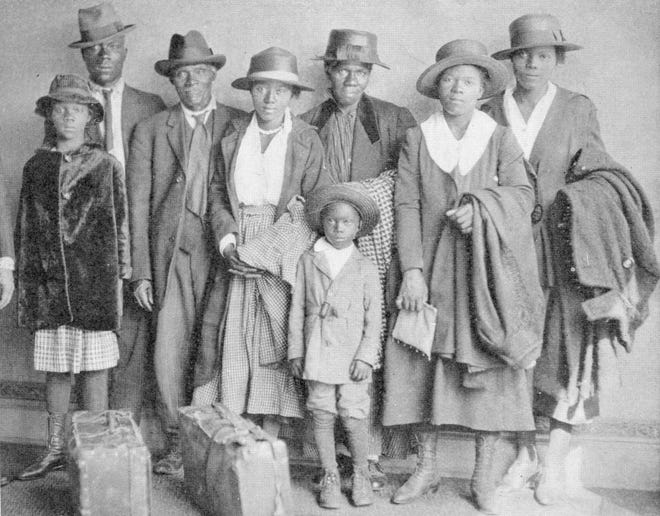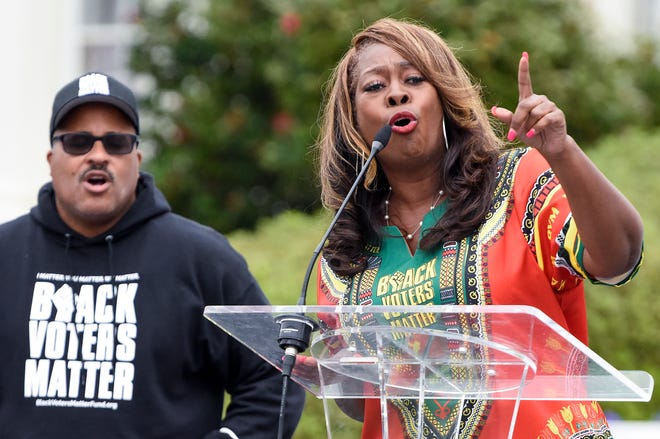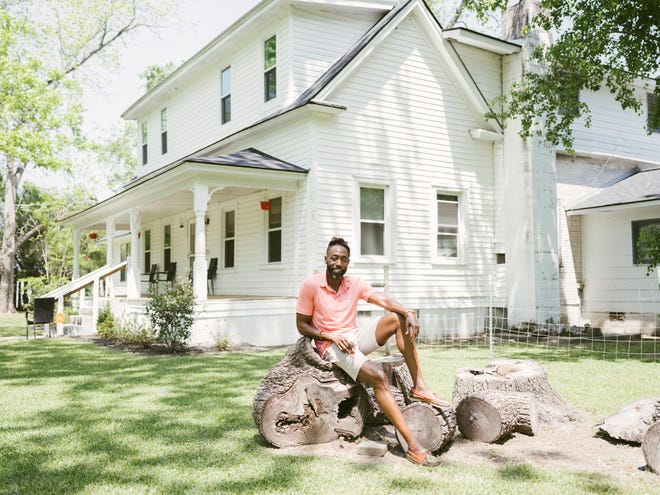- Going into the midterms Tuesday, a wave of new Black residents in the South could help fuel progressive policies and Democratic candidates.
- The Black population in Georgia has roughly doubled since 1990, moving from about 1.7 million to more than 3 million in the 2020 census.
- The trend is a reversal of the Great Migration, which saw anywhere from 5 to 6.5 million Black people leave the South searching for political and economic opportunities in the North and Midwest between 1910 through 1970.
ATLANTA — Malik Rhasaan can often be found at his popular southwest Atlanta restaurant, Che Butter Jonez, where the menu and other items take a decidedly Black and Northern flair.
The borough of Queens is emblazoned on what appears to be a New York City street sign. Other artwork around the restaurant features the legendary Hip Hop group Run-DMC, also of Queens. On the menu, there’s the “Who Wants Beef, Son ?!” burger.
New York can be felt everywhere in the Georgia establishment, and yet it is hundreds of miles away and a place he hasn’t lived for decades. Rhasaan left his hometown for Atlanta because it was “the Blackest place I’ve ever been,” and it offered him career growth and other opportunities.
“With New York costs compared to Atlanta, Georgia, you could just kind of get things started a little faster,” he said. “It’s a little easier to get momentum here.”
GEORGIA 2020 MIDTERMS: In the tight race for Georgia governor, Black men emerge as Stacey Abrams’ key voters
ELECTIONS: Gov. Brian Kemp, Democrat Stacey Abrams spar in Georgia gubernatorial debate over education, crime
Rhasaan, 50, is part of a wave of Black people who have left Democratic strongholds such as New York City and Detroit to move to Georgia, helping to change the political landscape of the Bible Belt that remains fertile ground for conservative politics. And going into the midterms Tuesday, the political coalition built between these new Black migrants who tend to vote blue, long-time Black Southern residents and others could help fuel progressive policies and Democratic candidates in Georgia in the future.
Democratic Sen. Raphael Warnock and Republican challenger Herschel Walker are in a tight race, polls show. Democrat Stacey Abrams is in a rematch with Republican Georgia Gov. Brian Kemp after losing to him by fewer than 60,000 votes in 2018.
These contests are partially being powered by the new Great Migration, researchers said. The trend is a reversal of the Great Migration, which saw anywhere from 5 to 6.5 million Black people leave the South searching for political and economic opportunities in the North and Midwest between 1910 through 1970.
The Black population in Georgia has roughly doubled since 1990, moving from about 1.7 million to more than 3 million in the 2020 census.
New Great Migration hits Georgia midterms
Roughly half of all Black Southern migrants come from the Northeast, according to census research complied by the Brookings Institution. In contrast, fewer than two-fifths of white migrants from the Northeast chose destinations in the South.
The Black population in Atlanta alone is larger than that of African Americans in Chicago, the city that helped launch the political career of former President Barack Obama and is sometimes called by scholars the “Political Capital of Black America.”
Black voters make up a third of eligible voters in Georgia, according to the Pew Research Center. In North Carolina, they make up about 23% of the electorate.
The number of Black voting-age residents in the South has grown by 15% since 2010, while it grew by 3% among white residents, according to a Pew article from 2019.
Georgia, North Carolina, Florida and Maryland are among the states that gained the highest number of Black migrants for most years since the Great Migration, as was Virginia, according to census data.
William Frey, a demographer at Brookings, said these trends will continue.
“The demography change brought by the Black migration of the second and third generation Black migrants will have a lot more to do with the Democratic vote in a place like Georgia than whatever small voting change patterns that might happen among Blacks,” he said.
Keneshia Grant, a political science professor at Howard University in Washington, D.C., said Black voters can be the deciding factor when whites, for instance, remain evenly split.
“When there is a unified Black vote, it makes it the case that politicians have to speak to those voters,” she said.
Even with the demographic change, she emphasized that demographics are not results. Turnout, voting rights laws and voter engagement will also play a role in the midterms.
Heading into the 2022 midterms, Rhasaan sees fewer Warnock signs along the streets near the restaurant than he did in 2021 — a possible indicator of less engagement in politics compared to when protests following George Floyd’s death helped electrify the electorate, he fears.
Rhasaan, founder of the advocacy group Occupy the Hood, expects more statewide representation, particularly among young people, will emerge in the South because of the demographic changes that have already happened.
“I see in the next 10 years or so, more (Black) people running, more people having an influence,” he said. “That’s just a no-brainer.”
‘You can’t ignore them all’
Since the beginning of the nation’s history, the South has been the home to most Black Americans.
Florida, Georgia, Mississippi, Arkansas, South Carolina and other localities are where nearly nine in 10 Black people were confined, forced into chattel slavery, then ushered into sharecropping and menial work, research shows.
By the 1900s, the first wave of Black migrants left the South, pulled by the prospect of less grueling Northern and Midwestern jobs and simultaneously pushed by the realities of Jim Crow segregation laws, political disenfranchisement and other discrimination.
By the second wave, which started in 1930 and ended by the 1970s, Blacks moved in more significant numbers, drawn by the prospect of jobs opened by World War I and further restrictions on immigration.
“Their migration fundamentally altered the American demographic landscape by shifting almost half of the Black population from primarily Southern and rural places to the urban North,” according to Grant’s book, “The Great Migration and the Democratic Party.”
In their new homes, their Black children could be educated. They had greater access to the ballot, drastically changing the electorate in those states, pushing civil rights issues to the fore and leading to increased Black representation.
In Detroit, for instance, the Black vote accounted for nearly 3% of the total voting-age population in 1915 and 43% by 1970, figuring in white flight and other factors, according to Grant’s book.
“There are some instances where either the number of Black people in a community or the way that community’s political system is organized makes it such that white politicians, in particular, can ignore them for a little bit longer,” said Grant, the Howard University professor. “By the time we get to 1965, 1970, the numbers in what I call the Great Migration cities — Chicago, New York, Philadelphia — their numbers are so high that you can’t ignore them.”
In 1970, the Great Migration drew to a close as deindustrialization took hold, leading to the end of Black manufacturing jobs that would never return. Moreover, segregation and discrimination were still barriers in the North.
Seeing opportunity and kinship in the South, Black people slowly moved back over the next few decades.
Democratic strategists often point out Cobb County as an example of how demographic changes have taken hold in Georgia. Just north of Atlanta, Cobb County was a former conservative stronghold that has become bluer as the population grows more diverse.
In 2020, the county’s sheriff, a Republican, was replaced by a Democrat. The same shift happened to the district attorney and the county commissioner. All three of the winners were Black.
Previously, the Sixth Congressional District, which includes parts of the county, was picked up in 2018 by Democratic Rep. Lucy McBath, a gun rights advocate and mother to Jordan Davis, who was killed in 2012 by a white man at a Florida gas station for playing loud music.
In the 1990s, then-House Speaker Newt Gingrich, a conservative, was the representative for the district.
Tharon Johnson, a Democratic strategist in Georgia, said the appeal for Cobb is multifaceted for people of color.
“You have a well-educated workforce of individuals who are Black and Brown, who choose to go there for the improved school system and quality of life,” Johnson said.
Michael DuHaime, a Republican strategist and former Republican National Committee political director, said the trends are concerning, particularly as the nation diversifies. He said Republicans need to recruit more Black voters and candidates.
“When (former President) Donald Trump came in, I think progress that Republicans have made, you know, was pushed back a number of years and there was too much of a nativist strain within the Republican Party,” he said. “My hope is that will go away at some point.”
‘Hope is bringing us back’
For many Black migrants, Georgia represents better opportunities and a changing environment.
After being raised in Detroit and living in other cities, Willie Davis and his fiancé considered relocating to Atlanta as Georgia moved purple during the 2020 presidential elections.
He and fiancée, Anna Nettles , who is white, had been searching to find a place where they could both thrive. They wanted to be closer to his mother and sister who lived in Florida.
Now, as a real estate professional working in both Detroit and Atlanta, Davis, 36, helps relocate many people of color from Detroit to the South. He said those clients often point to the Southern weather and opportunities within their fields of work.
“In a lot of these areas like Atlanta, like Houston, I’m seeing greater opportunities for Black people,” he said. “And I’m also seeing greater opportunities for Black people and people of color in places and spaces that were not there before.”
Many new residents are more likely to be college-educated Black Americans looking for more opportunities, Brookings said in research. And so, many of the advantages may not trickle down to struggling longtime Black Atlantans, advocates say.
While the South still has high poverty rates, especially in many Black communities, it is also a place where Black people can successfully tackle the structural racism that often drives these issues, activists said.
“We’ve got blood that is still saturated in this ground for what Black folks have done to bring wealth to this country,” said LaTosha Brown, co-founder of Black Voters Matter, an Atlanta-based advocacy group. “So if there is anywhere that literally rightfully is a space for Black prosperity … we believe it is in the South. We have paid for this space with our blood, sweat, tears.”
“Fear had us leave; hope is bringing us back,” she said.
That change can also be felt outside the confines of metro Atlanta. Today, Clinton Vicks is known for The Vicks Estate, Farm, & Fishery in Albany, Georgia. But as a young man, he left behind his hometown and moved to the North to pursue a career in the arts.
He found success. But after nearly a decade in New York, he felt the call of the South, much like his parents who moved to Detroit and back in the early 1970s.
During the pandemic, he started The Vicks Estate, Farm, & Fishery at a then-dilapidated nearly six-acre estate. He hopes to make a more significant role in his community, possibly sitting on an economic board in the historically Black side of the area.
For other African Americans looking to find their Black mecca, he said they need not search too far.
“You have something in you that you don’t have to find,” he said. “You take it with you.”
Tiffany Cusaac-Smith covers racial history for USA TODAY. Click here for her latest stories. Follow her on Twitter @T_Cusaac.







